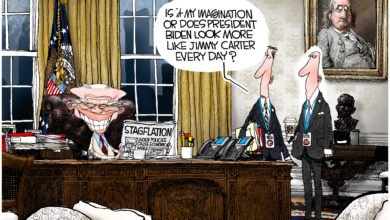35 of Ayn Rand’s Most Insightful Quotes on Rights, Individualism, and Government
Alisa Rosenbaum was one of the most controversial writers in America’s history. Why, then, have few people heard of her? Because both people’s plaudits and their intemperate attacks have been aimed at the new name she adopted after leaving Russia for America—Ayn Rand.
Her influence is beyond question. She sold more than 30 million books, and decades after her 1982 death, hundreds of thousands more sell each year. Atlas Shrugged has been ranked behind only the Bible as a book that influenced readers’ lives.
Some are devoted enough that Randian has become a descriptive term. Others use her name only to disparage opponents. Still others disagree with some of her ideas (e.g., while Rand was an often-strident atheist, capitalism is clearly defensible on Christian principles, and most historical defenses of liberty employed Christian rationales which conflict with Rand’s reasoning), yet find a great deal of insight in her analysis of liberty, rights and government.
As we mark the anniversary of Rand’s February 2 birth, consider some of her most insightful words:
- “Individual rights are the means of subordinating society to moral law.”
- “The recognition of individual rights entails the banishment of physical force from human relationships.”
- “The moral justification of capitalism is man’s right to exist for his own sake, neither sacrificing himself to others nor sacrificing others to himself.”
- “Man—every man—is an end in himself.”
- “No man or group may initiate the use of physical force against others.”
- “The only proper purpose of a government is to protect man’s rights.”
- “A proper government is only a policeman, acting as an agent of man’s self-defense, and, as such, may resort to force only against those who start the use of force…government that initiates the employment of force against men who had forced no one…reverses its only moral purpose.”
- “When the framers of the American republic spoke of “the people”…they meant a sum of individuals, each of whom…retains his inviolate guarantee of individual rights.”
- “Under a proper social system…a private individual may do anything except that which is legally forbidden; a government official may do nothing except that which is legally permitted…This is the American concept of ‘a government of laws and not of men.’”
- “A ‘right’…means freedom from physical compulsion, coercion or interference by other men.”
- “Rights impose no obligations on [neighbors] except of a negative kind: to abstain from violating his rights.”
- “The right to property…does not mean that others must provide him with property.”
- “The right to property…is not a guarantee that a man will earn any property, but only a guarantee that he will own it if he earns it.”
- “The right to life is the source of all rights—and the right to property is their only implementation. Without property rights, no other rights are possible.”
- “The collective cannot decide what is to be the purpose of a man’s existence nor prescribe his choice of happiness.”
- “Man holds…rights, not from the Collective nor for the Collective, but against the Collective…man’s protection against all other men.”
- “Any alleged ‘right’ of one man, which necessitates the violation of the rights of another, is not and cannot be a right.”
- “If some men are entitled by right to the products of the work of others, it means that those others are deprived of rights.”
- “America’s abundance was created not by public sacrifices to ‘the common good,’ but by the productive genius of free men.”
- “Since only an individual man can possess rights…’individual rights’ is a redundancy. But…“collective rights” is a contradiction in terms.”
- “Since the only proper function of a government is to protect man’s rights, it cannot claim title to his life in exchange for that protection.”
- “An individualist…says: ‘I will not run anyone’s life—nor let anyone run mine. I will not rule nor be ruled. I will not be a master nor a slave.'”
- “No one’s rights can be secured by the violation of the rights of others.”
- “The doctrine that “human rights” are superior to “property rights” simply means that some human beings have the right to make property out of others.”
- “Freedom…comes down to a single question: do you consider it moral to treat men as sacrificial animals and to rule them by physical force?”
- “Freedom, in a political context, means freedom from government coercion. It does not mean freedom from the landlord, or freedom from the employer, or freedom from the laws of nature which do not provide men with automatic prosperity.”
- “In a capitalist society, all human relationships are voluntary. Men are free to cooperate or not, to deal with one another or not, as their own individual judgments, convictions, and interests dictate.”
- “There’s no way to rule innocent men. The only power government has is the power to crack down on criminals.”
- “A society that robs an individual of the product of his effort…is…but a mob held together by institutionalized gang-rule.”
- “It is the institution of private property that protects and implements the right to disagree.”
- “The smallest minority on earth is the individual. Those who deny individual rights cannot claim to be defenders of minorities.”
- “Individual rights are not subject to a public vote…the political function of rights is precisely to protect minorities from oppression by majorities.”
- “What is the basic, the essential, the crucial principle that differentiates freedom from slavery? It is the principle of voluntary action versus physical coercion or compulsion.”
- “Whoever claims the right to redistribute the wealth produced by others is claiming the right to treat human beings as chattel.”
- “We are fast approaching the stage…where the government is free to do anything it pleases, while the citizens may act only by permission.”
However much some adore Ayn Rand and others despise her, those who seek wisdom wherever it can be found will find serious food for thought in her words on liberty, rights and government.
When so many promote the cognitive dissonance of pursuing supposed collective or social “justice” by the unjust expedient of violating the rights of individuals who make up society, she can stimulate our thought about foundational questions. And that is crucial, because, as George Mason said, “No free government, or the blessings of liberty, can be preserved to any people but by… frequent recurrence to fundamental principles.”
This article was originally published on FEE.org





Excellent compilation of Rand’s thoughts, thanks for putting it together. One more of her quotes that I would add to your list is her opinion of “The Virtue Of Selfishness”. If a person serves him or herself well and prospers for his or her family in the process, then these people also serve the broader society, so long as they don’t step outside the boundaries of the law.
Thanks again for a very thoughtful piece. Rand was a marvelous woman and thinker.